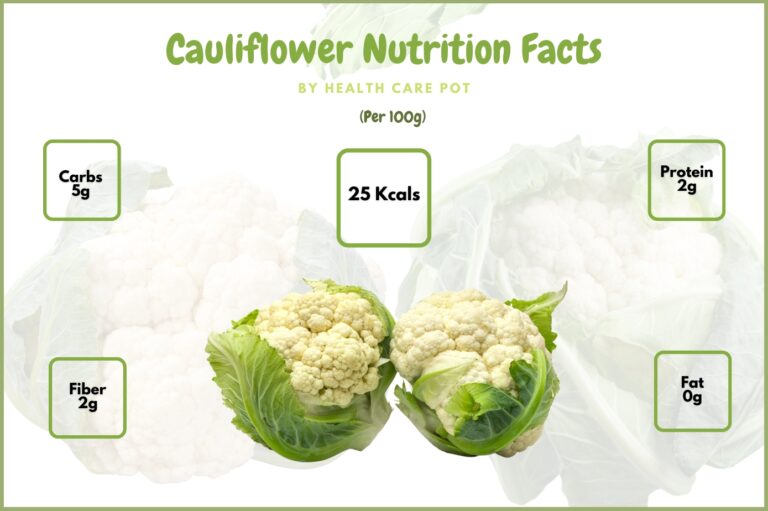Cauliflower is a super water-rich vegetable. It contains 92% of water. It has many health benefits, let's see it.
Cauliflowers are mostly produced in China and India (statics from 2021). The cauliflower's scientific name is 'Brassica oleracea var. botrytis'. It is used for medicine in diseases like cancer, diabetes, and heart disease.
Cauliflower Nutrition Facts
Here below table shows the cauliflower nutritional value per 100g.
Serving size 100 g
Servings per container 1 Calories from Fat 0 * Percent Daily Values are based on a 2,000 calorie diet. Your daily values may be higher or lower depending on your calorie needs.Nutrition Facts
Amount per serving
Calories 25
% Daily Value*
Total Fat 0g
0%
Saturated Fat 0g
0%
Trans Fat 0g
Cholesterol 0mg
0%
Sodium 30mg
2%
Total Carbohydrate 5g
2%
Dietary Fiber 2g
8%
Sugars 2g
Protein 2g
About 100 grams of cauliflower has 25 Kcals, 0 grams of fat, 5 grams of carbohydrates, and 2 grams of protein.
There is no cholesterol in the onion. It holds 30 mg of sodium.
Cauliflower Calories 100g:
100 grams of cauliflower contain 25 Kcals(104 kJ). It is low-calorie food because it includes 92% water. Most of the calories come from carbohydrates.
100 grams of cauliflower contains 5 grams of carbohydrates, 2 grams of fiber, and 2 grams of natural sugar. In 100 grams of cauliflower, Net carbs(Total Carbs-Fiber) should be 3 grams.
2 grams of sugar include:
Glucose 0.94g
Fructose 0.97g
Cauliflower doesn't contain fat(or contains less than 0.5g).
100 grams of cauliflower contain 2 grams of protein.
Cauliflower Glycemic Index:
The glycemic index of cauliflower is 10. It holds a low glycemic index.
Vitamins And Minerals In Cauliflower
Vitamines | Content | Minerals | Content |
|---|---|---|---|
Vitamin C | 48.2 mg | Calcium | 22 mg |
Vitamin A | 0 mcg | Phosphorus | 44 mg |
Vitamin E | 0.08 mg | Potassium | 299 mg |
Vitamin K | 15.5 mcg | Iron | 0.42 mg |
Vitamin B1 | 0.05 mg | Magnesium | 15 mg |
Vitamin B2 | 0.06 mg | Zinc | 0.27 mg |
Vitamin B3 | 0.507 mg | Copper | 0.039 mg |
Vitamin B6 | 0.184 mg | Manganese | 0.155 mg |
Vitamin B9 | 57 mcg |
100 grams of Cauliflower hold Vitamin C(54%), Vitamin A(0%), Vitamin E(1%) and Vitamin K(13%) of your RDA(Recommended Dietary Allowances).
Vitamin C improves immunity; Vitamin A supports your heart, lungs, and other organs to function properly; Vitamin E preserves healthy skin and eyes; and Vitamin K is required for blood clotting and healthy bones.
Cauliflower has an adequate amount of B vitamins. 100 grams of cauliflowers have Vitamin B1(thiamin) 4%, Vitamin B2(riboflavin) 5%, Vitamin B3(niacin) 3%, Vitamin B6 (pyridoxine) 14%, and Vitamin B9(folate) 14% of your RDA(Recommended Dietary Allowances). These vitamins require for digestion and good nerve function.
Minerals are also needed for the body's health. Let's check its portion value.
100 grams of cauliflower has Calcium 2%, Phosphorus 1%, Potassium 15%, Iron 3%, Magnesium 4%, Zinc 3%, Copper 4%, and Manganese 7% of your RDA (Recommended Dietary Allowances).
Calcium helps our bones; Phosphorus plays a vital role in inventing DNA and RNA; Potassium controls fluid balance; Iron reduces tiredness and fatigue; Magnesium maintains muscle, nerve function, and energy production.
Zinc plays an important role in building proteins; Copper builds red blood cells; Manganese assists the body in creating connective tissue, bones, and blood clotting factors.
Cauliflower Benefits:
Cauliflower Benefits For Skin:
Cauliflower contains vitamin C, which helps to level up the immune system. Vitamin C can fight against acne, pimples, and scars and give you clear skin. It also contains antioxidants that can be needed for healthy skin.
Cauliflower Benefits For Hair:
Cauliflower contains beta-carotene, that is needed for hair. Without beta-carotene, hair will become thin and lead to hair fall. Beta-carotene can help to make healthy hair.
Comment down your suggestions and queries in the comment section. We will love to hear from you.
Frequently Asked Questions(FAQ):
One cup (100 grams) of raw cauliflower contains about 5 grams of carbohydrates.
Yes, cauliflower is keto-friendly due to its low carbohydrate content. It can be used in many keto recipes.
Yes, cauliflower is commonly included in low-carb diets because of its low carbohydrate content. It can be used as a versatile and nutritious vegetable option.
In 100 grams of cauliflower, Net carbs(Total Carbs-Fiber) should be 3 grams.
Yes, cauliflower is a good source of dietary fiber. One cup(100g) of raw cauliflower provides approximately 2 grams of fiber.
One cup(100g) of raw cauliflower contains about 2 grams of sugar.
Yes, cauliflower is naturally gluten-free.
Cauliflower is a good source of dietary fiber, aiding digestion and promoting regular bowel movements. Including fiber-rich foods like cauliflower can contribute to a healthy digestive system.
Cauliflower can be a good food for weight loss due to its low calorie and carbohydrate content. It is also a filling vegetable that can help curb hunger and contribute to a balanced, calorie-controlled diet.

